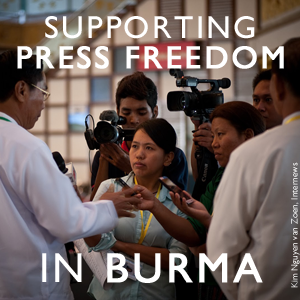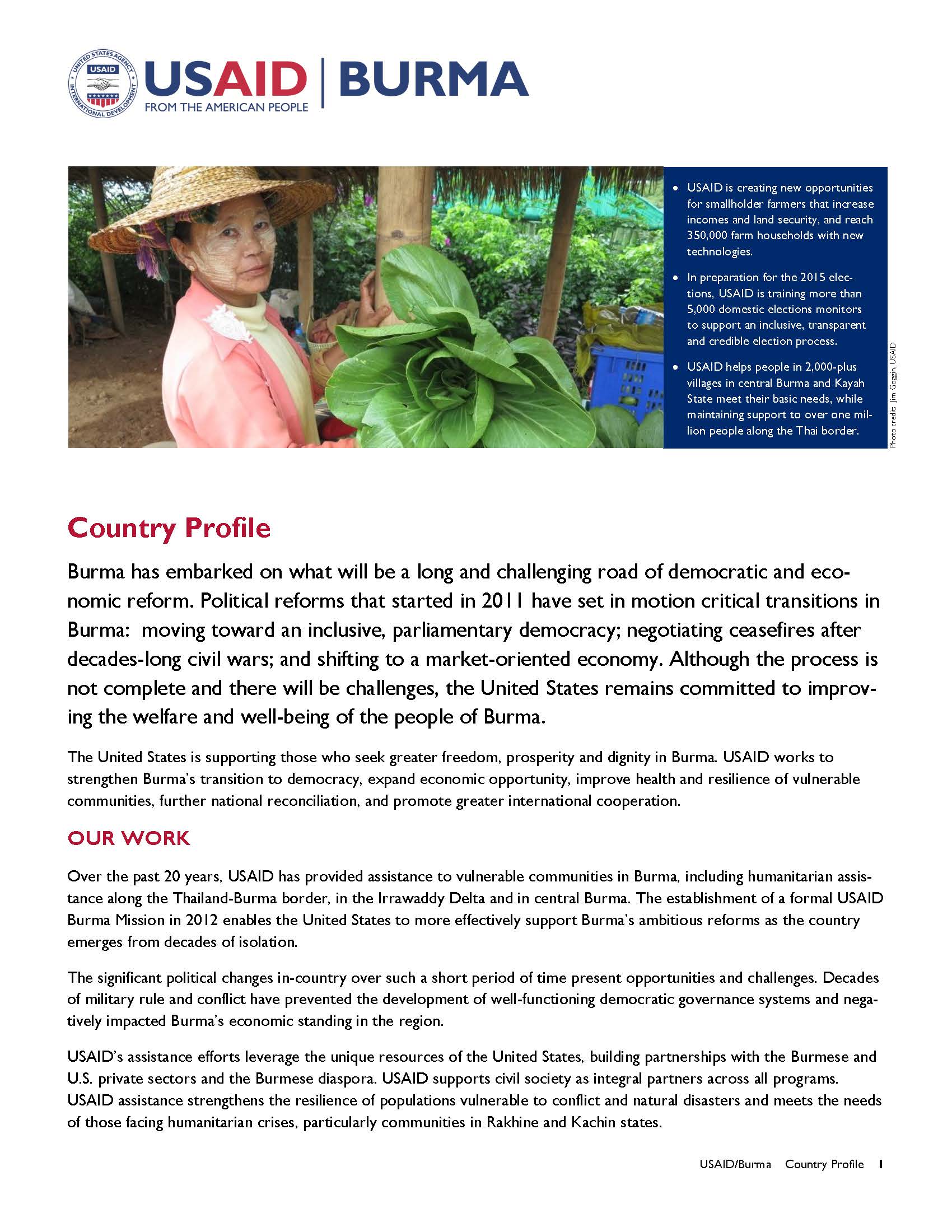Burma has embarked on what will be a long and challenging road of democratic and economic reform. Political reforms that started in 2011 have set in motion critical transitions in Burma: moving toward an inclusive, parliamentary democracy; negotiating ceasefires after decades-long civil wars; and shifting to a market-oriented economy. Although the process is not complete and there will be challenges, the United States remains committed to improving the welfare and well-being of the people of Burma.
The United States is supporting those who seek greater freedom, prosperity and dignity in Burma. USAID works to strengthen Burma’s transition to democracy, expand economic opportunity, improve health and resilience of vulnerable communities, further national reconciliation, and promote greater international cooperation.
Over the past 20 years, USAID has provided assistance to vulnerable communities in Burma, including humanitarian assistance along the Thailand-Burma border, in the Irrawaddy Delta and in central Burma. The establishment of a formal USAID Burma Mission in 2012 enables the United States to more effectively support Burma’s ambitious reforms as the country emerges from decades of isolation.
The significant political changes in-country over such a short period of time present opportunities and challenges. Decades of military rule and conflict have prevented the development of well-functioning democratic governance systems and negatively impacted Burma’s economic standing in the region.
USAID’s assistance efforts leverage the unique resources of the United States, building partnerships with the Burmese and U.S. private sectors and the Burmese diaspora. USAID supports civil society as integral partners across all programs. USAID assistance strengthens the resilience of populations vulnerable to conflict and natural disasters and meets the needs of those facing humanitarian crises, particularly communities in Rakhine and Kachin states.
2015 Burma Country Profile ![]() (pdf - 272k)
(pdf - 272k)
- USAID is creating new opportunities for smallholder farmers that increase incomes and land security, and reach 350,000 farm households with new technologies.
- In preparation for the 2015 elections, USAID is training more than 5,000 domestic elections monitors to support an inclusive, transparent and credible election process.
- USAID helps people in 2,000-plus villages in central Burma and Kayah State meet their basic needs, while maintaining support to over one million people along the Thai border.
DEMOCRACY, HUMAN RIGHTS AND GOVERNANCE
As the lead donor on elections, USAID is building the capacity of the election commission, political parties, civil society and the media to help ensure credible, transparent and inclusive elections in 2015. USAID is promoting respect for the rule of law and human rights, building transparent and accountable governance systems, supporting independent media, and fostering a vibrant, tolerant civil society. Through dialogue, USAID also supports inclusive and transparent processes to lay the foundation for political resolution to long-standing conflicts and a durable peace. In designing its programs, USAID carefully considers conflict dynamics to ensure that assistance does not exacerbate existing tensions and builds a future for Burma that is inclusive of all communities.
ECONOMIC GROWTH AND AGRICULTURE
USAID supports Burma’s economic reforms by enabling local enterprises to flourish, creating new economic opportunities for the majority of the people, and improving the livelihoods of smallholder farmers. USAID programs promote transparency and good governance to foster a business enabling environment, improve land tenure security for vulnerable populations, and increase responsible investment. With 70 percent of the population economically dependent on agriculture, USAID works to empower smallholder farmers and small and medium enterprises engaged in agriculture value chains by increasing access to markets, inputs and knowledge. USAID activities address both policy and implementation of reforms that impact agricultural productivity, food security, economic growth and smallholder farmers’ rights.
GLOBAL HEALTH
Burma’s population faces formidable obstacles to realize healthy, productive lives, especially with HIV, malaria and drug-resistant tuberculosis rates among the highest in the region. Working in partnership with the people of Burma, USAID is strengthening health systems and controlling and preventing the spread of infectious diseases, such as HIV and drug-resistant strains of malaria and tuberculosis. In response to the global call to end preventable maternal and child deaths, USAID builds the capacity of midwives and community-based volunteers to improve maternal and child health.










Comment
Make a general inquiry or suggest an improvement.